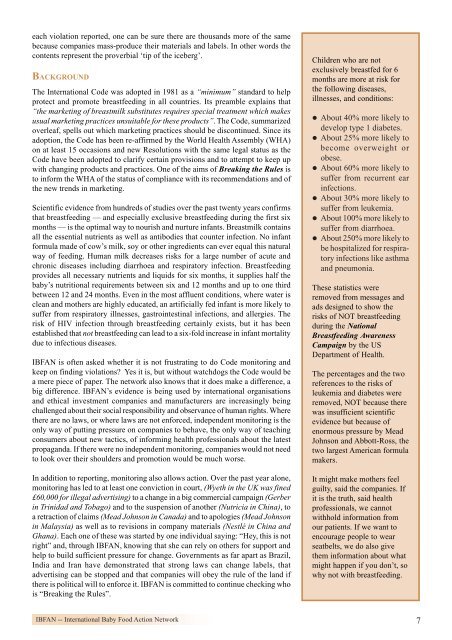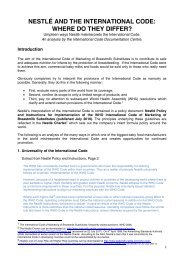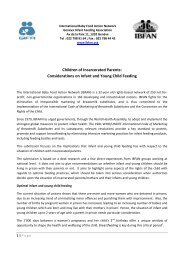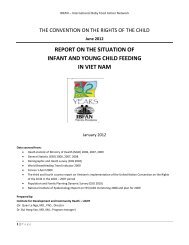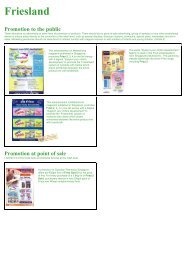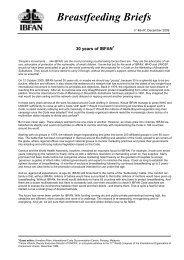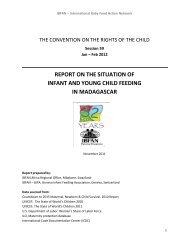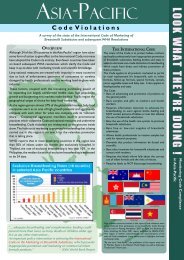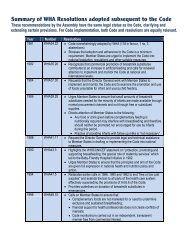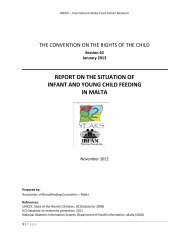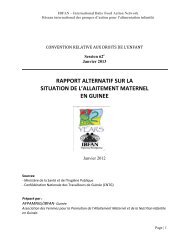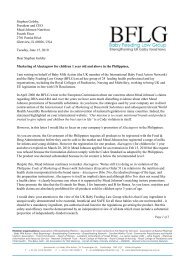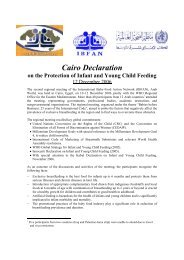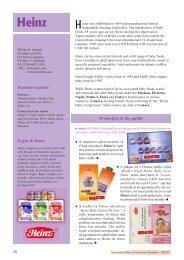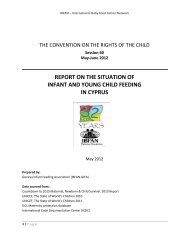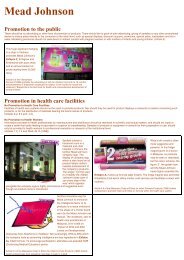Create successful ePaper yourself
Turn your PDF publications into a flip-book with our unique Google optimized e-Paper software.
each violation reported, one can be sure there are thousands more of the same<br />
because companies mass-produce their materials and labels. In other words the<br />
contents represent the proverbial ‘tip of the iceberg’.<br />
BACKGROUND<br />
The International Code was adopted in 1981 as a “minimum” standard to help<br />
protect and promote breastfeeding in all countries. Its preamble explains that<br />
“the marketing of breastmilk substitutes requires special treatment which makes<br />
usual marketing practices unsuitable for these products”. The Code, summarized<br />
overleaf, spells out which marketing practices should be discontinued. Since its<br />
adoption, the Code has been re-affirmed by the World Health Assembly (WHA)<br />
on at least 15 occasions and new Resolutions with the same legal status as the<br />
Code have been adopted to clarify certain provisions and to attempt to keep up<br />
with changing products and practices. One of the aims of Breaking the Rules is<br />
to inform the WHA of the status of compliance with its recommendations and of<br />
the new trends in marketing.<br />
Scientific evidence from hundreds of studies over the past twenty years confirms<br />
that breastfeeding — and especially exclusive breastfeeding during the first six<br />
months — is the optimal way to nourish and nurture infants. Breastmilk contains<br />
all the essential nutrients as well as antibodies that counter infection. No infant<br />
formula made of cow’s milk, soy or other ingredients can ever equal this natural<br />
way of feeding. Human milk decreases risks for a large number of acute and<br />
chronic diseases including diarrhoea and respiratory infection. Breastfeeding<br />
provides all necessary nutrients and liquids for six months, it supplies half the<br />
baby’s nutritional requirements between six and 12 months and up to one third<br />
between 12 and 24 months. Even in the most affluent conditions, where water is<br />
clean and mothers are highly educated, an artificially fed infant is more likely to<br />
suffer from respiratory illnesses, gastrointestinal infections, and allergies. The<br />
risk of HIV infection through breastfeeding certainly exists, but it has been<br />
established that not breastfeeding can lead to a six-fold increase in infant mortality<br />
due to infectious diseases.<br />
<strong>IBFAN</strong> is often asked whether it is not frustrating to do Code monitoring and<br />
keep on finding violations? Yes it is, but without watchdogs the Code would be<br />
a mere piece of paper. The network also knows that it does make a difference, a<br />
big difference. <strong>IBFAN</strong>’s evidence is being used by international organisations<br />
and ethical investment companies and manufacturers are increasingly being<br />
challenged about their social responsibility and observance of human rights. Where<br />
there are no laws, or where laws are not enforced, independent monitoring is the<br />
only way of putting pressure on companies to behave, the only way of teaching<br />
consumers about new tactics, of informing health professionals about the latest<br />
propaganda. If there were no independent monitoring, companies would not need<br />
to look over their shoulders and promotion would be much worse.<br />
In addition to reporting, monitoring also allows action. Over the past year alone,<br />
monitoring has led to at least one conviction in court, (Wyeth in the UK was fined<br />
£60,000 for illegal advertising) to a change in a big commercial campaign (Gerber<br />
in Trinidad and Tobago) and to the suspension of another (Nutricia in China), to<br />
a retraction of claims (Mead Johnson in Canada) and to apologies (Mead Johnson<br />
in Malaysia) as well as to revisions in company materials (Nestlé in China and<br />
Ghana). Each one of these was started by one individual saying: “Hey, this is not<br />
right” and, through <strong>IBFAN</strong>, knowing that she can rely on others for support and<br />
help to build sufficient pressure for change. Governments as far apart as Brazil,<br />
India and Iran have demonstrated that strong laws can change labels, that<br />
advertising can be stopped and that companies will obey the rule of the land if<br />
there is political will to enforce it. <strong>IBFAN</strong> is committed to continue checking who<br />
is “Breaking the Rules”.<br />
<strong>IBFAN</strong> -- International Baby Food Action Network<br />
Children who are not<br />
exclusively breastfed for 6<br />
months are more at risk for<br />
the following diseases,<br />
illnesses, and conditions:<br />
� About 40% more likely to<br />
develop type 1 diabetes.<br />
� About 25% more likely to<br />
become overweight or<br />
obese.<br />
� About 60% more likely to<br />
suffer from recurrent ear<br />
infections.<br />
� About 30% more likely to<br />
suffer from leukemia.<br />
� About 100% more likely to<br />
suffer from diarrhoea.<br />
� About 250% more likely to<br />
be hospitalized for respiratory<br />
infections like asthma<br />
and pneumonia.<br />
These statistics were<br />
removed from messages and<br />
ads designed to show the<br />
risks of NOT breastfeeding<br />
during the National<br />
Breastfeeding Awareness<br />
Campaign by the US<br />
Department of Health.<br />
The percentages and the two<br />
references to the risks of<br />
leukemia and diabetes were<br />
removed, NOT because there<br />
was insufficient scientific<br />
evidence but because of<br />
enormous pressure by Mead<br />
Johnson and Abbott-Ross, the<br />
two largest American formula<br />
makers.<br />
It might make mothers feel<br />
guilty, said the companies. If<br />
it is the truth, said health<br />
professionals, we cannot<br />
withhold information from<br />
our patients. If we want to<br />
encourage people to wear<br />
seatbelts, we do also give<br />
them information about what<br />
might happen if you don’t, so<br />
why not with breastfeeding.<br />
7


